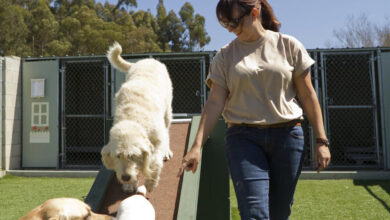What Happens If My Dog Bites Another Dog In California

1. Introduction
Dogs are beloved pets, but they can also be dangerous if not properly trained and managed. In the United States, each state has its own laws regarding dog bites and the liability of pet owners for any damages caused by their animals. This article will provide an overview of what happens if your dog bites another dog in California. It will discuss the relevant laws, as well as the rights and responsibilities of both pet owners in such a situation.
2. Overview of California Dog Bite Laws
In California, all dog owners are subject to strict liability for any injuries or damage caused by their animal. This means that if your dog bites another dog, you will be held responsible for any resulting harm or financial losses incurred by the other pet owner. The only exception to this rule is if you can prove that the injured animal was trespassing on your property or that it provoked your dog into attacking it.
3. The One Bite Rule and How it Applies in California
The one bite rule is a legal doctrine that states that a pet owner cannot be held liable for damages caused by their animal unless they had knowledge of their pet’s dangerous tendencies prior to the incident in question. In California, this rule does not apply; instead, all pet owners are strictly liable for any damage caused by their animal regardless of whether or not they had prior knowledge of its dangerous tendencies.
4. Dog Owner Liability in California
In California, a pet owner is responsible for all damages caused by their animal, including medical bills, pain and suffering, and property damage. If the injured party was able to prove that the pet owner acted negligently or recklessly (e.g., failed to keep their dog on a leash or failed to take steps to prevent it from attacking another animal), then they may also be able to pursue punitive damages from the pet owner as well.
5. Types of Damages Recoverable for Dog Bites in California
In California, victims of a dog bite can recover both economic and non-economic damages from the at-fault pet owner. Economic damages include medical bills, lost wages due to missed work days, and property damage resulting from the attack. Non-economic damages include compensation for pain and suffering, emotional distress, and loss of enjoyment of life due to the attack.
6. Statute of Limitations for Dog Bite Cases in California
In California, victims of a dog bite must file a lawsuit within two years of the date of the attack in order to recover damages from the at-fault pet owner. If they fail to do so, then they may be barred from recovering any compensation whatsoever for their injuries or losses stemming from the incident.
7. Negligence Per Se Rules for Dog Bites in California
California has several laws related to dogs which are known as “negligence per se” rules; if someone violates these laws and it results in an injury or death, then they may be held liable for any resulting damages even if there was no prior knowledge that their animal was dangerous or capable of causing harm. These laws include leash laws (requiring dogs to be kept on leashes when outside) and spay/neuter laws (requiring certain breeds of dogs to be spayed or neutered).
8. Defenses to a Dog Bite Claim in California
In addition to proving that you were negligent or reckless with your animal (which would make you liable even under negligence per se laws), an at-fault pet owner may also attempt to defend themselves against a claim by arguing that: 1) the injured party was trespassing on their property; 2) the injured party provoked their animal; 3) they were unaware that their animal was dangerous; 4) they made reasonable efforts to restrain their animal; 5) they were unaware that their animal had not been vaccinated against rabies; 6) they were unaware that their animal had not been spayed/neutered as required by law; 7) they were unaware that their animal had escaped its enclosure; 8) there was no negligence on behalf of either party; 9) there was contributory negligence on behalf of either party; 10) there was comparative negligence on behalf of either party; 11) there was assumption of risk on behalf of either party; 12) there was superseding cause unrelated to either party’s negligence; 13) there was intervening cause unrelated to either party’s negligence; 14) there was no proximate cause between either party’s negligence and injury/damage suffered; 15) there was no duty owed by either party with respect to injury/damage suffered; 16) there was no breach of duty owed by either party with respect to injury/damage suffered; 17) there was no causation between either party’s breach and injury/damage suffered; 18) there were other factors outside either party’s control which contributed to injury/damage suffered; 19) there were other parties who were partially responsible for injury/damage suffered but have not been named as defendants in this case; 20) applicable statutes have expired before suit could be filed against them (i.e., statute of limitations); 21) applicable statutes have been declared unconstitutional before suit could be filed against them (i.e., unconstitutional statute); 22) applicable statutes do not apply retroactively before suit could be filed against them (i.e., non-retroactive statute); 23) applicable statutes do not apply extraterritorially before suit could be filed against them (i.e., extraterritorial statute).
< h2 > 9 . Steps To Take If Your Dog Bites Another Animal Or Person < / h2 >
If your dog bites another animal or person , it is important that you take certain steps immediately . First , contact your veterinarian right away ; this will ensure that your pet receives proper medical care , while also providing evidence should legal action result from the incident . Second , contact local law enforcement ; depending on where you live , you may also need to contact Animal Control . Third , obtain contact information from witnesses ; if possible , take photos or videos at the scene . Fourth , document any medical treatment received by both animals involved ; this includes veterinary bills , medications administered , etc . Fifth , consult with an experienced attorney ; he or she can provide advice about how best to proceed with legal action if necessary .
< h2 > 10 . Steps To Take If You Are Bit By A Dog < / h2 >
If you are bit by a dog , it is important that you take certain steps immediately . First , seek medical attention right away ; even minor wounds should be treated promptly in order to prevent infection . Second , document all medical treatment received ; keep copies of all bills , medications administered , etc . Third , obtain contact information from witnesses ; if possible , take photos or videos at the scene . Fourth , contact local law enforcement ; depending on where you live , you may also need to contact Animal Control . Fifth , consult with an experienced attorney ; he or she can provide advice about how best to proceed with legal action if necessary .
< h2 > 11 . Conclusion < / h2 >
In summary , it is important for all pet owners understand what happens if your dog bites another dog in California . Pet owners are strictly liable for any injuries or damage caused by their animals according state law . Victims can recover both economic and non-economic damages resulting from such incidents as long as they file suit within two years after the attack occurred . Finally , both victims and pet owners should take immediate steps following an incident involving a dog bite in order ensure proper medical care is received while protecting legal rights should legal action become necessary .



